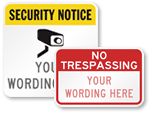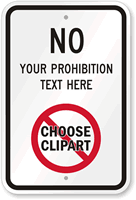Freshly manicured lawns and accessible sidewalks in neighborhoods often lure door-to-door salespersons, also known as “peddlers” or “solicitors” or just “an annoying pain in the neck.” Apartments, offices, and workplaces are not spared either, as solicitors try ever harder to reach the maximum number of potential customers. But not many property owners know they can exercise their legal right to refuse uninvited visitors and convey their preference of not being disturbed.
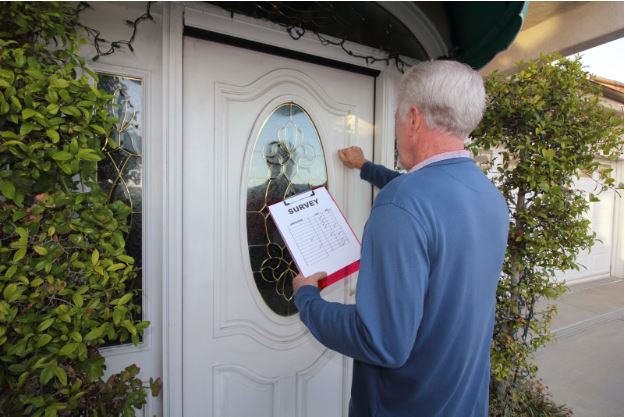
What is soliciting or solicitation?
Soliciting refers to door-to-door sales, canvassing, advertising, appealing, and campaigning - one of the oldest forms of selling or marketing a product or service. It is the act of requesting and/or receiving any money, material, or other benefit/assistance by physically visiting a property.
Some of the most common door-to-door soliciting activities include salespersons seeking donations, offering magazine subscriptions, asking for petition signatures, selling cookings, religious evangelism, and canvassing for a political campaign.
What are the types of solicitation?
- Commercial Solicitation It means any proposal to sell goods or services or disseminate information/menus, or the dissemination or collection of surveys for a commercial purpose.
- Religious Solicitation The request for money, property, financial assistance, or other things of value on the plea or representation that this benefit will be used for a religious purpose.
- Political Solicitation This can include seeking or attempting to seek any vote, fact, opinion, signature on any petition, or contribution; distributing, trying to distribute any political or campaign materials, leaflets, or conducting a poll.
- Charitable Solicitation A charitable solicitation, also known as a fundraising or nonprofit solicitation, is any attempt to raise funds or donations from people.
Is soliciting lawful?
Door-to-door soliciting is legally valid but subject to restrictions.
According to the First Amendment to the U.S. Constitution, door-to-door salespeople, known as ‘solicitors’ trying to reach out to residents in communities have a constitutional right to be there because the amendment protects the free exercise of religion, freedom of speech, freedom of the press, freedom of association, freedom of petition, and freedom of peaceable assembly.
However, homeowners too have a right to privacy on their private property. Pursuant to a Supreme Court verdict, Dallas law university calls attention to the fact that -
Whether it is a mailman, salesman, or even a close friend, knocking on a homeowner’s front door is an invitation to attempt entry, and people are allowed to approach through a front path, knock reasonably, wait briefly to be received, and leave if the homeowner does not grant the invitation to enter.
First Amendment rights can conflict with privacy rights in solicitation cases. Hence careful consideration is required in assessing whether or not soliciting is legal in the case. State and local laws, which vary between jurisdictions, generally govern the act of soliciting and should be consulted.
What are the laws on solicitation in the US?
There are no federal laws, particularly on solicitation and often the act of soliciting falls under the ambit of trespassing laws of states that don’t allow anyone to stay on a property without permission or consent. For example, in many Georgia cities like Roswell and Johns Creek, solicitors need to apply and obtain a permit prior to engaging in door-to-door solicitations.
What are No Soliciting Signs?
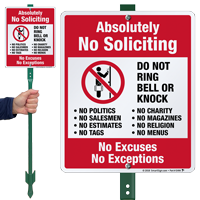

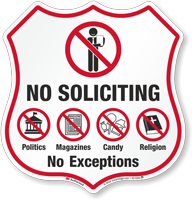
A No Soliciting sign is a tool to deter door-to-door solicitors and can be used to demand – or request – that the people attempting to sell or solicit not disturb you at home or business. A sign can help avoid a nasty confrontation and lay down the rules on your property, so you don’t have to confront or argue with the solicitor in person.
Are No Soliciting Signs legally enforceable?
In many jurisdictions, it is illegal to ignore "no soliciting" signs with the burden mostly resting upon the solicitor to pay attention to the clearly visible warning sign and leave the premises without attempting to contact the homeowner. For instance, code 5.04.050 of Woodinville (Washington) city law clearly states “All canvassers, peddlers or solicitors must abide by all posted restrictions on private property for said activities. It shall be unlawful for any peddler, solicitor, or canvasser to enter upon any private premises posted with visible signs or other notifications stating “No Peddlers” or “No Solicitors” or “No Canvassers” singularly or in combination with one another.”
What are the penalties for not obeying ‘No Soliticiting’ signs?
The subject again is covered under local laws. For instance, not obeying a “No Solicitors” sign in the Township of Clark (NJ) is a violation of law and the violator is liable for a penalty of up to $500 for the first offense, $150 - $500 for the second, and $300 for the third offense or 90 days in jail or community service.
As always, check with your local state and county laws for updated penalties.
What makes an effective No Soliciting Sign?
Merely placing a board with the words ‘no soliciting’ may not suffice. Signs should follow some general rules to be most effective.
Placement
A sign obscured with overgrown foliage, obstructed by a mailbox, or faded due to heat/moisture, will not yield the required results. The location also plays a major role in how well the signs are read. Posting the signs discreetly at places where it is impossible for solicitors to miss them is a good practice for property owners. Signs can be hung overhead, on a signpost at eye level, thrust in the yard with a stake, or applied on windows with the help of adhesive backing.
Avoid Vague Message
Be very careful about what you choose as your No Soliciting Sign text. Avoid jargons that may not be widely understood. Use proper headers that best describe your message - Private Property, Notice, No Soliciting, Warning, Do Not Knock, or any other bold text or phrase. Also, be specific and concise with your message. For instance, if you want solicitors not to disturb you within business hours, your sign must display specific working hours. Custom No Soliciting Signs offer the best solution here.
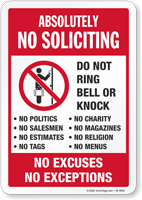
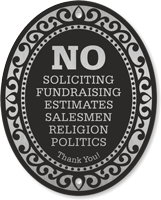
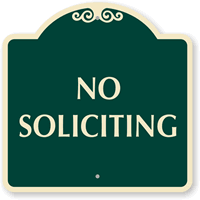 >
>
Choose Appropriate Size
The size of the sign definitely affects the readability especially when you want people to read the sign from a distance. A good thumb rule for outdoor signs is that each inch of the letter height allows for a viewing distance between 25 to 50 feet. No soliciting sign for house or apartment can be smaller but has to be clearly visible at the entrance.
Watch this video.
Appearance
Signs design, color combination, and shape are decisive elements in a sign’s effectiveness. A professional, text-only sign is appropriate for businesses, whereas HOA’s can experiment with designer signs, unique shapes, and elegant colors.
Where should No Soliciting Signs be posted?
Different states, counties, and cities have different regulations pertaining to the posting requirements of No Soliciting Signs. For example, Hubbard City in Oregon likes property owners to post a No Soliciting Sign -
- On or near the property's boundaries, at normal points of entry.
- For property without any barriers to entry at the boundaries, the sign must be placed at the primary entrance to the structure.
The best practice for residents is to use windows, doors, fences, trees, and entrances of the property to post No Soliciting Signs.
Apart from entrances, workplaces and businesses can post soliciting signs in parking lots, so that clingy salespeople do not make an excuse for missing your warning.



